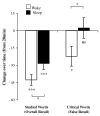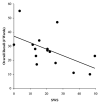The role of sleep in false memory formation - PubMed (original) (raw)
Randomized Controlled Trial
The role of sleep in false memory formation
Jessica D Payne et al. Neurobiol Learn Mem. 2009 Oct.
Abstract
Memories are not stored as exact copies of our experiences. As a result, remembering is subject not only to memory failure, but to inaccuracies and distortions as well. Although such distortions are often retained or even enhanced over time, sleep's contribution to the development of false memories is unknown. Here, we report that a night of sleep increases both veridical and false recall in the Deese-Roediger-McDermott (DRM) paradigm, compared to an equivalent period of daytime wakefulness. But while veridical memory deteriorates across both wake and sleep, false memories are preferentially preserved by sleep, actually showing a non-significant improvement. The same selectivity of false over veridical memories was observed in a follow-up nap study. Unlike previous studies implicating deep, slow-wave sleep (SWS) in declarative memory consolidation, here veridical recall correlated with decreased SWS, a finding that was observed in both the overnight and nap studies. These findings lead to two counterintuitive conclusions - that under certain circumstances sleep can promote false memories over veridical ones, and SWS can be associated with impairment rather than facilitation of declarative memory consolidation. While these effects produce memories that are less accurate after sleep, these memories may, in the end, be more useful.
Figures
Figure 1
Sleep increases both veridical and false recall. Results represent combined performance in both college populations (see Supplementary Information for individual college statistics). (A) Increased recall of studied words (overall and corrected recall); (B) increased recall of critical words (strongly semantically associated, but unstudied words). Note that sleep did not increase false recall of words other than the critical word (intrusions). Error bars = s.e.m. *** P<.001; ** P<.01.
Figure 2
Change in recall performance across 12 hours, relative to the 20min baseline, in the Wake and Sleep groups. Values have been converted to percents to equate recall of studied words (out of 96 possible words) and critical words (out of 8 possible words). While veridical recall of studied words deteriorated significantly from baseline in both the Wake and Sleep groups, false recall of critical words deteriorated from baseline only in the Wake group. False recall in the Sleep group non-significantly increased from baseline. Error bars = s.e.m. *** P<.001; * P < .05.
Figure 3
Negative correlation between overall recall and SWS. (A) Correlation between overall recall and total minutes spent in SWS, r = −0.47, _P_=0.03; (B) Correlation between overall recall and percent of total sleep time spent in SWS, r = −0.55, _P_=0.009. See Supp Fig. S2 for corrected recall correlations.
Figure 4
An afternoon nap selectively increases false recall. (A) equivalent recall of studied words in the Nap and Wake groups (overall and corrected recall); (B) increased recall of semantically associated, but unstudied words (critical words) in the nap group. Error bars = s.e.m. * _P_=.02
Figure 5
Negative correlation between overall recall and total minutes spent in SWS in the nap study, r = −0.54, _P_=0.037 (Experiment 3).
Similar articles
- Interaction of sleep and emotional content on the production of false memories.
McKeon S, Pace-Schott EF, Spencer RM. McKeon S, et al. PLoS One. 2012;7(11):e49353. doi: 10.1371/journal.pone.0049353. Epub 2012 Nov 7. PLoS One. 2012. PMID: 23145159 Free PMC article. - The impact of sleep on true and false memory across long delays.
Pardilla-Delgado E, Payne JD. Pardilla-Delgado E, et al. Neurobiol Learn Mem. 2017 Jan;137:123-133. doi: 10.1016/j.nlm.2016.11.016. Epub 2016 Nov 27. Neurobiol Learn Mem. 2017. PMID: 27903437 - Sleep reduces false memory in healthy older adults.
Lo JC, Sim SK, Chee MW. Lo JC, et al. Sleep. 2014 Apr 1;37(4):665-71, 671A. doi: 10.5665/sleep.3564. Sleep. 2014. PMID: 24744453 Free PMC article. - The whats and whens of sleep-dependent memory consolidation.
Diekelmann S, Wilhelm I, Born J. Diekelmann S, et al. Sleep Med Rev. 2009 Oct;13(5):309-21. doi: 10.1016/j.smrv.2008.08.002. Epub 2009 Feb 28. Sleep Med Rev. 2009. PMID: 19251443 Review. - Differential effects of non-REM and REM sleep on memory consolidation?
Ackermann S, Rasch B. Ackermann S, et al. Curr Neurol Neurosci Rep. 2014 Feb;14(2):430. doi: 10.1007/s11910-013-0430-8. Curr Neurol Neurosci Rep. 2014. PMID: 24395522 Review.
Cited by
- The Epistemic Limits of Impactful Dreams: Metacognition, Metaphoricity, and Sublime Feeling.
Kuiken D. Kuiken D. Brain Sci. 2024 May 22;14(6):528. doi: 10.3390/brainsci14060528. Brain Sci. 2024. PMID: 38928529 Free PMC article. Review. - Sleep shapes the associative structure underlying pattern completion in multielement event memory.
Lutz ND, Martínez-Albert E, Friedrich H, Born J, Besedovsky L. Lutz ND, et al. Proc Natl Acad Sci U S A. 2024 Feb 27;121(9):e2314423121. doi: 10.1073/pnas.2314423121. Epub 2024 Feb 20. Proc Natl Acad Sci U S A. 2024. PMID: 38377208 Free PMC article. - A generative model of memory construction and consolidation.
Spens E, Burgess N. Spens E, et al. Nat Hum Behav. 2024 Mar;8(3):526-543. doi: 10.1038/s41562-023-01799-z. Epub 2024 Jan 19. Nat Hum Behav. 2024. PMID: 38242925 Free PMC article. - A registered report testing the effect of sleep on Deese-Roediger-McDermott false memory: greater lure and veridical recall but fewer intrusions after sleep.
Mak MHC, O'Hagan A, Horner AJ, Gaskell MG. Mak MHC, et al. R Soc Open Sci. 2023 Dec 6;10(12):220595. doi: 10.1098/rsos.220595. eCollection 2023 Dec. R Soc Open Sci. 2023. PMID: 38077219 Free PMC article. - Sleep consolidates stimulus-response learning.
Miao X, Müller C, Lutz ND, Yang Q, Waszak F, Born J, Rauss K. Miao X, et al. Learn Mem. 2023 Sep 19;30(9):175-184. doi: 10.1101/lm.053753.123. Print 2023 Sep. Learn Mem. 2023. PMID: 37726140 Free PMC article.
References
- Bartlett FC. Remembering. Cambridge University Press; 1932.
- Brainerd CJ, Reyna VF. Fuzzy-trace theory: dual processes in memory, reasoning, and cognitive neuroscience. Advances in Child Development and Behavior. 2001;28:41–100. - PubMed
- Brainerd CJ, Reyna VF. The Science of False Memory. Oxford University Press; Oxford: 2005.
- Buzsaki G. The hippocampo-neocortical dialogue. Cerebral Cortex. 1996;6:81–92. - PubMed
- Buzsaki G. Memory consolidation during sleep: a neurophysiological perspective. J Sleep Research. 1998;7(Supplement 1):17–23. - PubMed
Publication types
MeSH terms
Grants and funding
- M01 RR001032/RR/NCRR NIH HHS/United States
- M01 RR001032-30A10924/RR/NCRR NIH HHS/United States
- R01 MH048832/MH/NIMH NIH HHS/United States
- MH48832/MH/NIMH NIH HHS/United States
LinkOut - more resources
Full Text Sources
Medical
Research Materials




